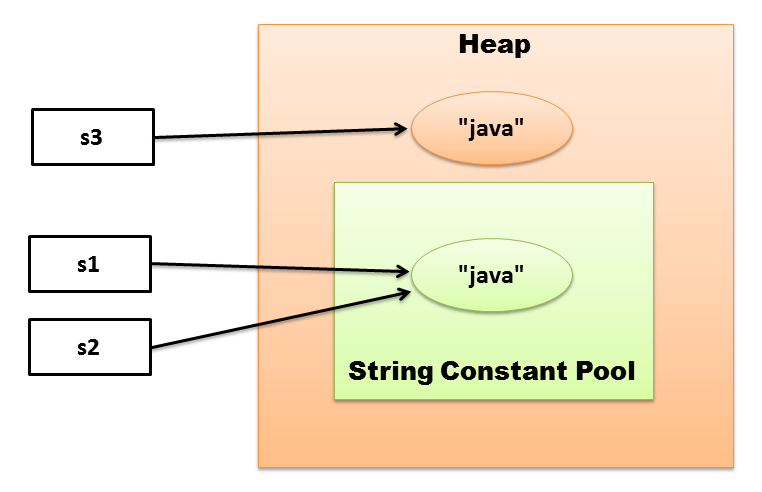Introduction to Strings
String is an object that represents sequence of char values. Strings are immutable in Java. There are two ways to create string in Java
- By String literal
- By new keyword
String myString1 = "Pankaj Singh";
String myString2 = new String("Pankaj");
here, i have used my name as a string you can take any other example
Note: String literal create no new object if it exists already in the string constant pool (SCP) which is a special place for all strings in heap memory. Create string of same object using new keyword.This will create new object outside the string pool if it already exist in it

Note I want you guys to try it for yourself instead to only copy and pasting.
String methods in Java
indexOf()
indexOf() used to find characters and substrings in a string. It returns the index of first occurrence from left of the passed string or character
syntax - public int indexOf(String str, int fromIndex)
- str - substring to be search
- fromIndex - search begin from this index
search "world" in "Hello world!" string
- str = "Hello world!"
target = "world"
int firstOccurence(String str, String target){ return str.indexOf(target); } //return index of first occurence of target
toCharArray()
toCharArray() used to form a character array of a string
syntax - public char[ ] toCharArray()
Example : check if string is palindrome of not
//palindrome = "taccat"
boolean checkPalindrome(String palindrome){
char[] chArr = palindrome.toCharArray();
int len = palindrome.length();
for(int i=0; i<len; i++){
if(chArr[i] != chArr[len-i-1]){
return false;
}
}
}
charAt()
charAt() Used to find the character at particular index
syntax - public char charAt(int index)
Example: count no. of spaces in the string
String str = "Upskill by learn by doing"
int len = str.length();
int count = 0;
for(int i=0; i<len; i++){
if (str.charAt(i) == " " ) count++;
}
System.out.println(count); //4
concat()
concat() Used to concatenate two strings
syntax - public String concat(String str)
Example : concatenate last name and firstname
String firstName = "Jon";
String lastName = "snow";
String fullName = firstName.concat(lastName);
System.out.println(fullName); //Jon snow
replace()
replace() Used for replacing characters and substrings in a string
syntax - public String replace(char oldChar, char newChar)
Example : remove all white spaces from the string
String str = "remove all whitespaces from this string";
String newStr = str.replace(" ", "");
System.out.println(newStr);
substring()
substring() Used to extract a portion of a string from original string
syntax - public String substring(int beginIndex, int endIndex)
Example : print first 3 character of a string
String str = "God is almighty";
System.out.println(str.substring(0, 3)); //God
split()
split() Used to breaks a given string around matches of the given regular expression.After splitting against the given regular expression, this method returns a char array
syntax - public String[] split(String regex, int limit)
limit : number of strings return after split
String str = "123-456-789";
String[] arrOfStr = str.split("-", 2);
for (String a : arrOfStr)
System.out.println(a);
//123
//456-789
compareTo()
compareTo() It compares the given string with the current string lexicographically. It returns a positive number, negative number, or 0
- if s1 > s2, returns +ve number
- if s1 < s2, returns -ve number
- if s1 == s2, returns 0
syntax : public int compareTo(String anotherString)
String s1 = "hello";
String s2 = "hello";
String s3 = "world";
String s4 = "gg";
System.out.println(s1.compareTo(s2)); //0 because both are equal
System.out.println(s1.compareTo(s3)); //-15 because "h" is 15 times lower than "w"
System.out.println(s1.compareto(s4)); //1 because "h" is 1 times greater than "g"
strip()
strip() To eliminate all trailing and leading whitespaces from the given string
syntax - public String strip()
Example
String s1 = " Hello World ";
System.out.println(s1.strip()); //Hello World
valueOf()
valueOf() Used to return string representation of passed argument
syntax - public static String valueOf(char[] data)
Note : valueOf() has many overloaded variants that aid in the conversion of almost any primitive form to string
char array[] = {'a', 'b', 'c', 'd', 'e', 'f', 'g'};
System.out.println(String.valueOf(array)); //abcdefg
